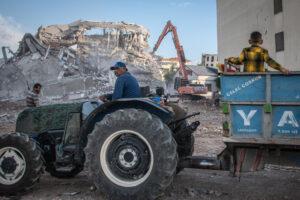Stop jailing journalists, Mr Mubarak
Egypt's decision to jail four newspaper editors does more to damage the reputation of President Hosni Mubarak than anything they ever wrote.
Dear Mr Mubarak,
I was shocked by the news that the editors of four of Egypt's most popular and outspoken independent newspapers received one-year prison terms with labour. This was particularly troubling because things had, relatively speaking, been looking up in terms of political and press freedoms over the past couple of years.
Does this mark the beginning of the end of that? And what were the crimes of Ibrahim Issa of the resurrected al-Dustour (The Constitution), Adel Hammouda of al-Fagr (Dawn), Wael el-Ebrashi of Sawt el-Umma (Voice of the Nation) and Abdel-Halim Qandil of al-Karama (Pride)?
Well, according to the verdict passed against them, they had “defamed” you, your son, Gamal, and the ruling National Democratic party (NDP). The court ruled that the four newspapermen had inflicted “direct damage” and that “the assault on the ruling party and its figures could denigrate its status in the eyes of the community”.
But I wonder what is more damaging to your status in the eyes of the Egyptian people and the international community: speculative newspaper reports about Gamal inheriting the presidency and your ailing health; or what is almost universally viewed as an attempt to muzzle the freedom of the press?
The Egyptian press syndicate said in a statement that it considered the sentences a “declaration of war on press freedom”. It has called an emergency meeting on Sunday to discuss a response to this “aggression” and the attempt to “intimidate journalists and smash their pens”.
Your harshest critic, Ibrahim Issa, who is facing an additional charge of spreading false rumours about the state of your health, described his and the other three sentences as “a death announcement for the freedom of press in Egypt”. But you still have a chance to perform some intensive care by reversing the sentences.
“It's time for the president to come down from the status of pharaoh to that of a human being,” Issa was also quoted as saying.
Back in 2005, you began to do just that when you amended the constitution to allow, for the first time in the post-1952 republic's history, multi-candidate presidential elections. While it was mainly for show, it did break the taboo of questioning the president and allowed people to hope that better times would be ahead. I, for one, was intent on recklessly losing my electoral virginity and voting against you but the embassy here did not accept expatriate ballots.
But the renewed freedom and vigour of the media seems to have caused your regime to panic and, last year, a new press law – which the four editors seem to have fallen foul of – reaffirmed the ability of courts to jail journalists who accuse government officials of financial malpractice and raised the fine for political “libel” cases. Leading opposition figures, such as Ayman Nour, bloggers and Islamists have also been locked up.
This is symptomatic of the regime's “Dr Jekyll and Mr Hyde” approach to liberty. For instance, the 1990s promised to be the start of an unstoppable drift towards new freedoms, despite a crackdown on Islamists, until the economy took a nosedive and people began voicing their discontent more vociferously around the turn of the millennium.
The general prosecutor claims that the reports of your ill health and possible death have harmed national economic interests. In fact, Egypt's official news agency MENA reported the central bank as claiming that the rumours had prompted the flight of £170 million of foreign investments in just two days.
But rather than jailing journalists, I have a far fairer and more workable solution for ensuring a smooth transition of power ahead of your eventual death. So I do hope, Mr president, that you or one of your aides read The Guardian, although I somewhat dread the prospect that you do, after what happened yesterday. But I am fortunate, because I live in a country where I am more or less free to write what I want. I do not need to be as courageous as these four prisoners of conscience to speak my mind.
I call on you to resign. After more than a quarter of a century at the helm, it's time for you to go into a well-earned retirement and let others fight it out for the prized mantle. Ill health or not, you know you've earned it.
Besides, you've been complaining for years about the burdens of office: feeding and housing and creating jobs for a fast-growing population. “Governing Egypt is no picnic,” you once said in an interview. “It's tough. You have limited resources, a growing population, and the needs of the people. That makes me exert a massive effort.”
You are also fond of saying that Egypt has never enjoyed such stability and prosperity as during your presidency. If that is the case, then why, pray explain, has the country been in a constant state of emergency since you took office? Stability and emergency are not comfortable bedfellows.
Stepping down would also, in one fell swoop, silence the persistent speculations, which you deny, that you are grooming your son to take over. Of course, Gamal would be free to run in any eventual presidential race and, if he were to win the popular vote fair and square, then the Egyptian people would welcome him as their leader.
It is well known among Egyptians that you are preoccupied by what kind of legacy you will leave behind and how you will be remembered. What better way is there for your name to live on than by gifting the Egyptian people with a functioning democracy? For years, you have been suggestively wiggling reform before our noses. It's time you delivered on your promises.
_______
This article first appeared in The Guardian on 14 September 2007.


